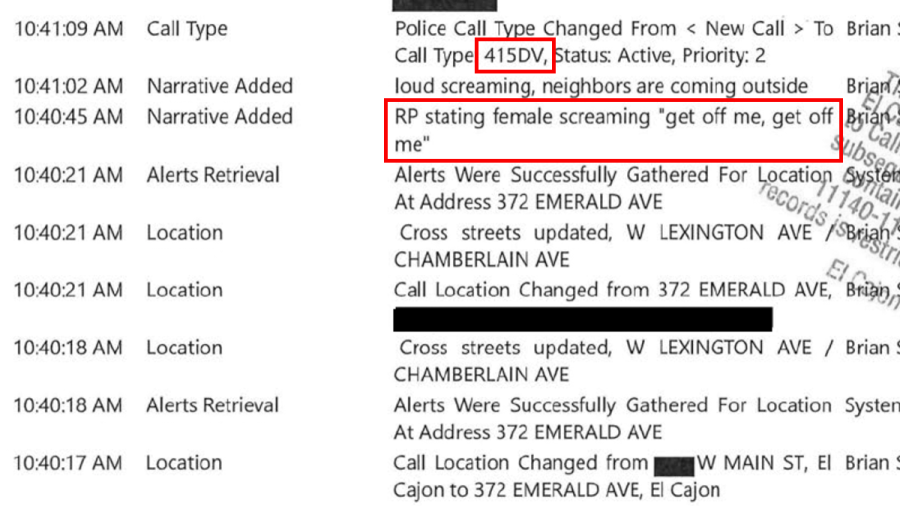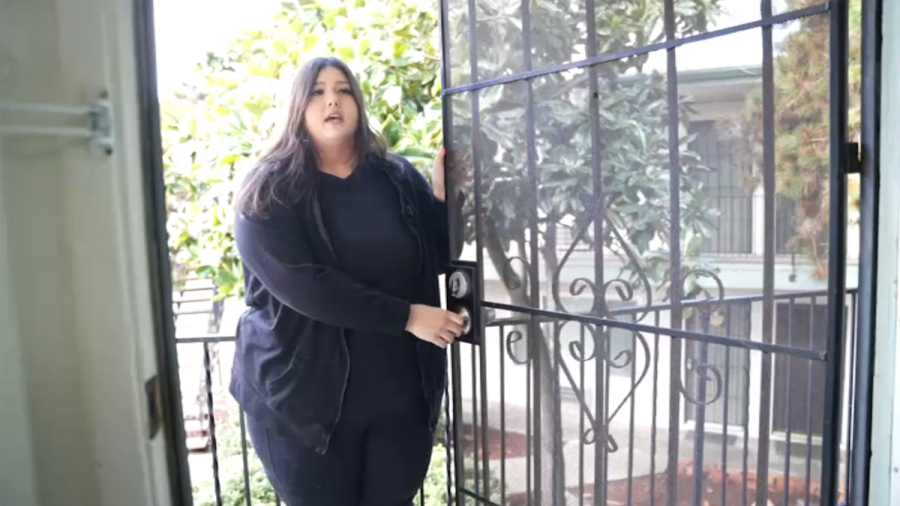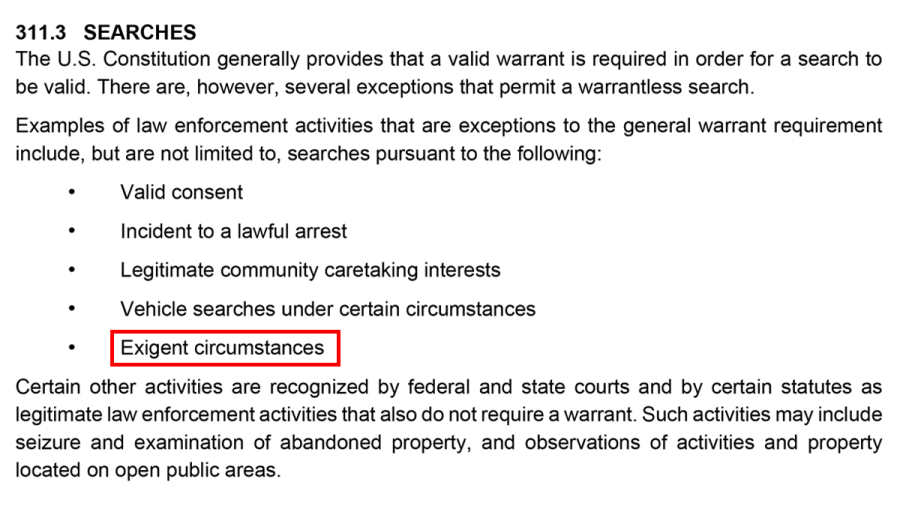Veterinary student Alexis Padilla says she was home alone getting ready for work when she heard a loud banging on her apartment door. On the other side stood El Cajon Police officers, including Cpl. Phillip Disque.
El Cajon Police will not comment on what happened next. But Padilla told NBC 7 Investigates officers forced their way in without her consent and detained her on the floor for nearly an hour. Before they left, they ticketed her for a misdemeanor offense – obstructing an officer.
“I felt like my rights were taken away,” said Padilla. “I felt like an animal.”
Redacted police records obtained by NBC 7 Investigates show the incident started around 10:30 am on Saturday, Jan. 20, when someone called 911 and told dispatchers they could hear a woman screaming, “Get off me! Get off me!” That caller also told dispatchers the sound came from Padilla’s apartment, where the caller claimed a couple recently moved in and often argued. The dispatcher marked the call as “disturbing the peace with domestic violence.”

But Padilla says none of that matches up. For starters, at the time of the 911 call, the 26-year-old said she was alone inside her apartment. Her roommate had already left for the day. And another thing, Padilla moved into her apartment back in 2020, not a few months ago like the 911 caller described.
“I told him, ‘Oh I’m sorry, it might be my TV, but I promise you I’ll turn it down,’” Padilla recalled telling Cpl. Disque from behind her screen door. “‘There’s nobody home. He said, ‘Can I come in and check?’ and I said, ‘No, you’re not allowed. I’m home alone. I don’t feel safe.’”
Padilla says she closed the door and walked back to her room, but Cpl. Disque did not take no for an answer, and within minutes heard the loud banging a second time.
This time, when Padilla opened her interior door, she says Disque told her that her apartment building manager was fetching him a copy of Padilla’s key. Alarmed, Padilla opened her screen door to look for her building manager. Instead, she saw a second El Cajon police officer standing outside her door.
Padilla says she tried to shut her door again, but says Disque pulled it back open from his side of the door and quickly overpowered her. Before she knew it they were both in her living room.
“He’s pushing me and I’m fighting with him and I’m like, ‘Stop! Stop! There’s nobody here! What are you doing?!’”

Padilla says she ran to her bedroom, where Disque and another officer chased her and handcuffed her face down on the ground. More than a week later, Padilla showed NBC 7 Investigates visible bruises on both arms. But even though officers quickly confirmed she was home alone, she says she stayed handcuffed for nearly an hour.
“Honestly, I feel like he was just upset because I did tell him no and I closed the door and he didn’t want to leave,” said Padilla. “It was just a power play to me. And they violated my rights for no reason.”
An El Cajon Police spokesman said they consider Padilla’s misdemeanor offense of obstruction an active investigation, which is why the department also won’t release any body camera video.
“That would be a circumstance that would be so out of the ordinary,” said retired law enforcement officer Cameron Gary. “You know, having to force your way to investigate a [domestic violence] call. It’s just not that common. It just isn’t.”
Over the course of Gary’s 30-year law enforcement career, he served 12 years with the San Diego County Sheriff’s Department, including with the SWAT unit. Gary also served 15 years with the San Diego District Attorney where he retired as a supervising investigator.
During his years in uniform, Gary says he was often dispatched to a domestic violence call several times a week.
“I have never, with maybe one or two exceptions, had a person not let us in,” said Gary. “When you tell them, ‘Hey I have to check. We can’t leave. I have to check.’ And there’s ways to talk to people and let them know that. Most people are pretty reasonable about that. It’s just about how you package it. And if you package it the right way it shouldn't be a problem.”
Normally, police can’t force their way inside your home without first getting your consent or a warrant. But, if a crime might be happening or someone might be in immediate danger, under the law, police are required to act. It’s called “exigent circumstances” and 911 calls concerning possible domestic violence are always considered exigent.

“Police have an obligation, legal as well as moral, ethical obligation to take some action to prevent that [domestic violence] from happening,” said Gary.
He says if officers have to force their way inside someone’s home, there’s a good reason why officers often detain anyone inside.
“You’re entering a person’s home,” said Gary. “You don’t know who’s in the house. You don’t know if she’s running to get a weapon. You don’t know if she’s the suspect or the victim. You don't know any of that.”
“When police knock on your door you have many rights,” San Diego criminal defense attorney David Shapiro said.
But Shapiro told us there are limits to what police can do under the law.
“[Exigent circumstances] does not give law enforcement the opportunity to come into your house and stay there indefinitely,” Shapiro said.
Those special exigent circumstances allowing police the right to search your home cease once a reasonable person could determine there’s no crime happening, and no one in immediate danger, Shapiro said. In a small apartment the size of Padilla’s, he said that should have only taken a couple minutes.
Shapiro questioned whether police had the right to force their way into Padilla’s apartment in the first place.
“If there was a positive interaction with law enforcement that said, ‘I’m fine, I’m the only one here,’ there’s a really strong argument that if an exigency existed when the door was closed, it went away when the door was opened,” Shapiro said.
As for Padilla’s misdemeanor, Shapiro told us an obstruction charge only holds up if you delay an officer from doing their lawful duty. But if officers are inside your home unlawfully, outside the scope of exigent circumstances, he said you have the right to act reasonably to prevent them from doing their job.
“On its face, it’s not a good look for El Cajon police,” Shapiro said.
“There’s ways you can manage it without it getting totally off the rails like this,” Gary told us.
When someone wouldn’t let him inside their homes, Gary said he encouraged homeowners to call police and verify that he was supposed to be there.
“I just don’t believe you have to fight your way through everything,” said Gary. “And I don’t think the public expects that or wants that frankly.”
Padilla says she hasn’t been able to sleep, and is now looking to move outside El Cajon, anywhere with a different police department.
“I felt violated,” said Padilla. “I felt unheard. And I felt they took away my rights when they didn’t have to. This is horrible. This is exactly why people are afraid of the police.”
What should you do if police want to search your home without a warrant?
- Be polite and respectful.
- Ask officers to get a warrant before searching your home.
- If officers claim exigent circumstances, call 9-1-1 and verify the officers are who they say they are. Legitimate officers will always carry an ID.
- Tell the officers you want to document and record their search and take video of what officers do inside your home.
- Never threaten officers.
- Don’t let officers search beyond the scope of what they said they would search. For example, if officers are there to search your home, don’t give them access to also search your car or your person. Respectfully, tell officers to leave and return with a warrant if they want to search anything else.

